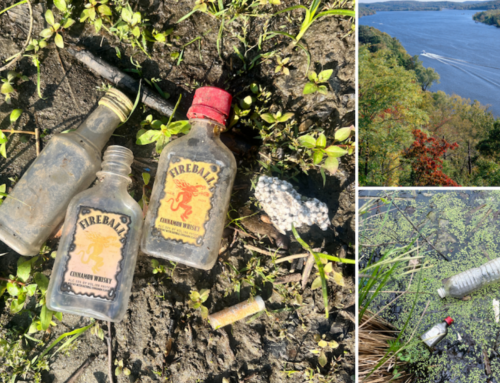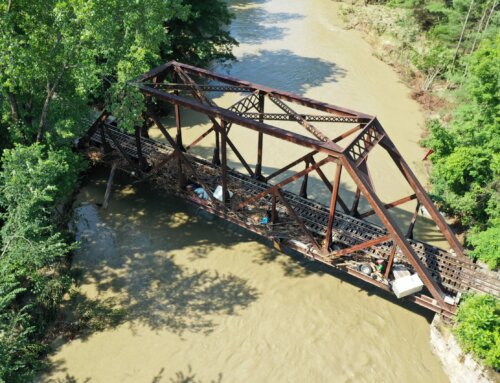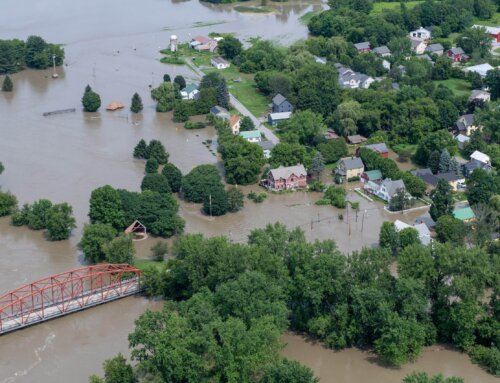February 27, 2023
House Committee on Appropriations
Vermont State House
115 State Street
Montpelier, VT 05633
Dear Chair Lanpher and Members of the Committee,
The undersigned organizations, together as members of the Water Caucus, write to provide comments on the Governor’s FY24 Proposed Budget as well as offer recommendations regarding the allocation of funds for water infrastructure and climate resiliency projects and programs. In the past two years, the state of Vermont received an unprecedented infusion of federal dollars in the American Rescue Plan Act (ARPA) and has further opportunities in the Infrastructure Investment and Jobs Act (IIJA). This, coupled with a surplus of one-time state revenue, provides a generational opportunity to address the backlog of water infrastructure improvements to benefit water quality and upgrade drinking water and wastewater infrastructure for all Vermonters.
Our organizations thank the House Committee on Appropriations and the Vermont Legislature for their ongoing support for clean water and climate resiliency projects and programs. The last two years witnessed an unprecedented level of funding, largely through allocations of ARPA funds. However, the $219 million in ARPA funds dedicated in the FY22 and FY23 State Budgets only addressed a portion of what the Agency of Natural Resources (ANR) has identified as a $2 billion need to address the backlog of water infrastructure and other projects. This backlog not only impacts human health and water quality, but also affects Vermont’s economy, recreational opportunities, and contributes to the state’s housing crisis.
Additionally, our organizations ask the House Committee on Appropriations for your general support of funding to ANR for the continued investment into projects and programs that focus on nature-based solutions that provide multiple benefits beyond just pollution reduction. Co-benefits can often include support for rural working lands, outdoor recreation, bird and wildlife habitat, and climate resilience. Even with the increased state and federal spending for pollution reduction through water infrastructure and similar programs, the ability to incorporate the co-benefits of nature-based solutions will provide expanded advantages for Vermonters.
Below, our organizations offer proposals to continue to address this backlog, as well as support for specific proposals by the Scott Administration.
Water Caucus Proposals:
1. Repeal the Sunset on the 0.2% Property Transfer Tax Clean Water Surcharge
The Property Transfer Tax Clean Water Surcharge (PTT) is a dedicated revenue source that provides the Clean Water Fund (CWF) with between $5 to $8 million annually. However, the CWF PTT sunsets in 2027. Further, the current statutory language directs $1 million of this PTT funding to the Vermont Housing & Conservation Board (VHCB) to pay for a housing bond. When the CWF PTT sunset occurs, a new PTT of 0.04% begins just for the VHCB bond payments until 2039, when the bond is fully paid. The Water Caucus asks that the House Appropriations Committee remove the sunset, so funds would be directed to the CWF and to VHCB beyond 2027. We also propose that when the housing bond is repaid in 2039, this $1 million be directed back to the CWF.
(See Appendix A for suggested language)
2. Additional ARPA Funding for Residential and Small Community Water Infrastructure
It is our understanding that not all state agencies are distributing ARPA funds in a timely manner, posing a risk that some funds may not be encumbered by the end of calendar year 2024. With this, our organizations advocate that ARPA funds in danger of being returned to the
federal government be re-allocated in the FY24 Budget to the Agency of Natural Resources, which has proven adept at encumbering ARPA funds.
Our proposal would provide additional funding for drinking water and wastewater infrastructure in smaller towns to support in-fill housing development in town centers. It would also provide additional needed funds for residential low-income wastewater and drinking water infrastructure. Both of these programs were included in the FY23 State Budget, so the mechanisms for dispersal are already in place at the Dept. of Environmental Conservation (DEC).
Proposed FY24 Budget Language
(x) In fiscal year 2024, $25,000,000 is appropriated from the American Rescue Plan Act (ARPA) – Coronavirus State Fiscal Recovery Funds to the Department of Environmental Conservation to support water and wastewater projects, as follows:
(1) $20,000,000 to municipalities with small and primarily residential customer bases to upgrade or replace existing water or wastewater treatment systems; and,
(2) $5,000,000 to replace, make repairs, and improve failed on-site drinking water, wastewater and water supplies for Vermonters with low to moderate income or who are unable to access or afford market rate loans.
This is in addition to the Governor’s request for $10 million in one-time General Funds for this program, called the Healthy Homes Initiative, which is also supported by the Water Caucus. See below.
3. Establish a Climate Resiliency Funding Program for Flood Hazard Mitigation
This proposal would develop an annual funding program at DEC dedicated to climate resiliency. The funds would provide for the protection and restoration of floodplains and river corridors in order to protect communities from climate-related weather events. Further, funding for dam removal would provide for safety from flooding caused by rapidly-swelling rivers due to these weather events. Also included is an increase in funding for expanded partner support to implement and maintain these climate resiliency projects.
Proposed FY24 Budget Language
Sec. xx. Climate Resilience
A total of $10,000,000 will be allocated from the General Fund as follows:
(a) $7,500,000 to the Department of Environmental Conservation for climate resilience programs to improve landscape resilience and mitigate flood hazards to be allocated as:
(1) $5,000,000 for climate resiliency projects to be distributed as block grants to statewide land conservation and watershed organizations for buyouts, easements, and restoration of flood-vulnerable lands. Eligible climate resiliency projects include:
(a) Floodplain or easement purchase to allow for natural flood storage.
(b) Floodplain restoration to improve floodplain function.
(c) Natural flood storage such as wetland restoration.
(d) Forest purchase for biodiversity protection and carbon sequestration.
(2) $2,500,000 to fund strategic dam removal projects, prioritized by public safety threats due to flood risk, community resilience to climate impacts, and river connectivity.
(b) $1,500,000 to the Dept. of Forests, Parks & Recreation for investment in Vermont’s natural and working lands through state match for the Forest Legacy Programs to draw down federal funding for ecological restoration and climate resiliency on private lands.
(c) $1,000,000 to the Department of Environmental Conservation for development grants to land conservation and watershed organizations for partner support and capacity building to assist in statewide climate resiliency projects based on natural resource restoration and preservation. These grants may be used to hire additional staff, implement cost-effective administrative practices, and fund internal programs to facilitate the implementation of climate resiliency projects.
The Water Caucus also supports additional funds for the Vermont Association of Conservation Districts (VACD) to increase the base funding for the fourteen Natural Resources Conservation Districts to meet their statutory requirements working with farmers.
Water Caucus Support for Governor’s One-Time Funding Proposals
1. Funding for the Healthy Homes Initiative
The Healthy Homes Initiative was created by ANR last year and funded in the FY23 State Budget. The program provides grant funding for low-income Vermonters to repair and replace failed residential water and wastewater systems. It is our understanding that when the Agency informed the public of this program, it was inundated with requests from homeowners in need of assistance for safe drinking water sources and septage systems.
Our organizations support this allocation of one-time General Funds in addition to the ARPA funds allocation we recommended above. The need requires funding from both sources. While the ARPA funds must be encumbered by the end of calendar year 2024, the one-time General Funds have no such deadline, providing DEC with more flexibility.
Sec.B.1100 (a)(24)(A) $10,000,000 for the Healthy Homes Initiative. Funds will be used to make repairs or improvements to drinking water, wastewater or stormwater systems for Vermonters with low to moderate income and/or living in manufactured housing
communities (MHCs).
2. Funding for Environmental Justice Positions at ANR
The Water Caucus supports the allocation of funds for three full-time Environmental Justice staff positions at ANR. While it is our understanding that one-time funds were used for these positions in the FY23 Budget, we question this continued use of one-time funds and instead ask the House Appropriations Committee to allocate annual General Funds to ensure the positions
are maintained beyond one year.
Sec.B.1100 (a)(21)(D) $300,000 for Environmental Justice positions created in 2022 Act 154 Sec. 4(b) and funded with a one-time appropriation in fiscal year 2023. Funds will be used to provide one additional year of funding for the following positions: one fulltime
Civil Rights Compliance Director; and two fulltime positions to assist in the implementation of the Environmental Justice State Policy and support the Environmental Justice Advisory Council.
3. Continued Funding for PFAs Groundwater Remediation
PFAS chemicals harm our bodies’ immune systems and cause diseases like kidney and testicular cancer. These chemicals are highly mobile, persistent in the environment, and have contaminated various Vermont waters. This funding will help ensure groundwater – a critical source of drinking water – is tested and remediated for any PFAS contamination.
Sec.B.1100 (a)(24)(C) $1,000,000 for Polyfluoroalkyl Substances (PFAS) technical assistance. Funds will be used to support statewide groundwater PFAS remediation efforts.
4. Allocation of $27 million in State Match of Supplemental State Revolving Fund in the Capital Bill
Our organizations support the Governor ‘s proposal to allocate $27 million in one-time General funding to the Capital Expenditure Cash Fund for the supplemental State Revolving Loan fund in Section 9 of the FY24/FY25 Capital Bill. This use of one-time General Funds is instead of the bonded dollars usually allocated in the Capital Bill.
ANR estimates that the total need for wastewater and drinking water repairs and upgrades exceeds $860 million. The ARPA funding has done a tremendous job of addressing this issue but needs remain. The IIFA will provide additional federal funding for the Clean Water State Revolving Fund (CWSRF) and the Drinking Water State Revolving Fund (DWSRF) from Federal FY22 to FFY26. The total federal allocation to the CWSRF over five years is $54.2 million and for the DWSRF over five years is $110.5 million. This supplemental IIJA SRF funding is in addition to the annual SRF funding from EPA. One should view this five-year supplemental funding as effectively replacing depleted ARPA funds, allowing for a continuation of work on needed water infrastructure projects.
However, a state match is required in order to draw down the supplemental IIJA SRF funds, in this case 10% for FFY22 and FFY23 and then 20% for FFY24, FFY25, and FFY26. The state match for both CWSRF and DWSRF over these five years is a total of $27 million. While we acknowledge it is unusual to allocate funds this far in advance, essentially ‘parking’ money before it is needed, the allocation of surplus one-time funds provides that this allocation request will not need to occur every year and would allow for advanced planning of critical
water infrastructure projects with the knowledge and assurance that Vermont will receive this federal funding. We ask that the House Appropriations Committee support this allocation of $27 million in one-time General Funds to the Capital Expenditure Cash Fund.
Conclusion
This continued investment of federal funds and one-time surplus state funds builds on the once-in-a-generation opportunity to invest in clean water infrastructure programs that will benefit water quality, provide safe drinking water, and update wastewater systems, while
adding the needed co-benefits of development of affordable housing and making our municipalities more climate resistant. We ask the House Committee on Appropriations to make these generational investments in ensuring clean water and climate resiliency in Vermont.
Sincerely,
Lori Fisher, Executive Director
Lake Champlain Committee
David K. Mears, Executive Director
Audubon Vermont
Kathy Urffer, River Steward
Connecticut River Conservancy
Dale Ellen Azaria, Vice President and State Director (Interim)
Conservation Law Foundation
Lauren Hierl, Executive Director
Vermont Conservation Voters
Jared Carpenter, Acting Chair
Vermont Council of Trout Unlimited
Jon Groveman, Water and Policy Program Director
Vermont Natural Resources Council
cc: Rep. Amy Sheldon
Chair, House Committee on Environment & Energy
Rep. Emilie Kornheiser
Chair, House Committee on Ways & Means, and
Vice-Chair, Joint Fiscal Committee
Rep. Alice Emmons
Chair, House Committee on Corrections & Institutions







